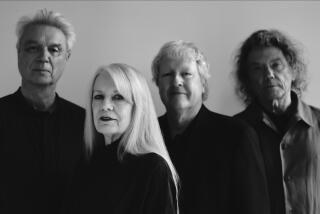Energetic ‘PsychoDerelict’ Finds Life Beyond the Who : Peter Townshend, one of rock’s most intellectually restless eccentrics, pursues new musical stories and earns a rousing response from his audience.
- Share via
H ope I die before I get old.
Pete Townshend didn’t get around to his most famous line during his Wiltern Theatre concert on Thursday, but the sentiment seemed relevant in a couple of ways.
Townshend performed with such enthusiasm and energy that he might have been trying to suspend the aging process. And by the end of the show, everyone was older--by a good three hours.
Not a bad night’s work for a 48-year-old rock ‘n’ roll father figure who could spend these days adding up his “Tommy” royalties and polishing his Tony.
Townshend performed himself into the ground for a couple of decades with the Who, but after a long time away from it, he was fairly bursting with excitement at being on stage--humming with energy, he conveyed a palpable sense of spontaneity, connection and discovery. If he was sometimes a little clumsy in his playfulness, he was never less than genuine.
Townshend, backed by a solid band of Brit-rock pros, drew a classic-rock audience that was primed for old Who songs, but only “Magic Bus,” a teasing snippet of “I’m a Boy” and a band-introducing version of Keith Moon’s percussive “Cobwebs and Strange” predated “Tommy”--and the reborn rock opera contributed only two songs to the set.
More than an hour of the show was given over to a performance of Townshend’s new “PsychoDerelict” album, a story-linked cycle of songs whose inappropriateness for radio play is what prompted Townshend to undertake his first solo tour.
Townshend (who also plays Wednesday at Copley Symphony Hall in San Diego) is one of rock’s most intellectually restless eccentrics, and his introduction of the piece typified his compulsion to analyze and discuss things to death, as he reflected on the criticisms of the work as “indulgent” and defended its engagement with “big things.”
With actors John Labanowski, Linal Haft and Jan Ravens portraying the principals--an embittered, has-been rock star, his manager and a Machiavellian femme fatale journalist--the unwieldy piece didn’t gain much narrative coherence from this staging.
But the best of its songs seemed even better than on the record, and there was something eerily amusing about seeing Townshend standing amid these materialized figments of his imagination. The performance generated a compelling presence that hooked the audience, which stuck with it and gave it a rousing response.
The argument for more early Who songs instead of the later ones isn’t one for nostalgic fulfillment, but simply for a fuller picture of the artist. He might feel closer to the more mature themes of his later songs, but would it be so bad to use this largely retrospective situation to summon some of the rage, confusion and awakening of “My Generation,” “Substitute,” “The Kids Are Alright,” et al.?
Aside from some fairly pointless blues excursions, the collection of Who and solo-album songs tended to focus on the values of faith, community and commitment (Dylan’s “Girl From the North Country” was offered as an affirmation of his long and enduring marriage).
By the time of the encores “Magic Bus” and “Won’t Get Fooled Again,” with old Who colleague John Entwistle pulled from the wings to play bass, Townshend’s windmill guitar strokes and trembling Statue-of-Liberty stances that earlier in the show seemed like halfhearted references to a distant past carried their old liberating force.
Indulgent he may be, but he’s also completely worth indulging.
More to Read
The biggest entertainment stories
Get our big stories about Hollywood, film, television, music, arts, culture and more right in your inbox as soon as they publish.
You may occasionally receive promotional content from the Los Angeles Times.










